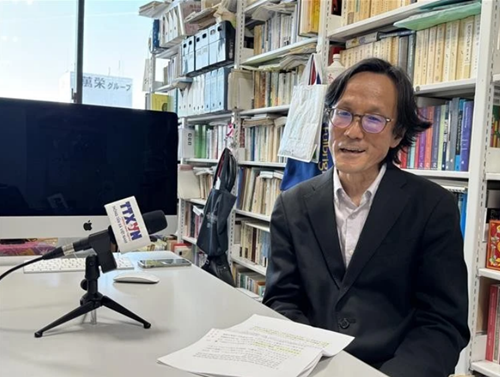Speaking to Vietnam News Agency correspondents in Japan on the occasion of the 135th birthday of President Ho Chi Minh (May 19, 1890 - 2025), the Japanese scholar said that President Ho Chi Minh is well-known worldwide not only for leading the Vietnamese people to gain independence. He is also considered an iconic leader of the decolonization movement in the Southern hemisphere, especially in Asia, Africa, Latin America.
    |
 |
|
Professor Shimizu Masaaki from Japan’s Osaka University |
First, President Ho Chi Minh was a rare leader who skillfully combined the Vietnamese nationalism with the international socialist ideology. He learned the theory and practice of the international communist movement through his activities in France and the Soviet Union, and flexibly applied them to the actual conditions of Vietnam
In other words, he succeeded in gaining widespread support by proposing a strategy that prioritized national liberation without being too biased towards class struggle.
Second, President Ho Chi Minh's leadership was unique in the terms of building a bridge between ideals and practice, between ideology and the masses. He did not indulge in idealism, but instead developed politics based on the words and experiences of ordinary people such as farmers and workers. His people-centered political philosophy is not just a slogan but an exercise in governance based on the trust in the people, which is why the President continues to be loved as a charismatic leader who was close to the people, Shimizu said.
Third, President Ho Chi Minh's influence went beyond Vietnam to deeply inspire leaders in other colonized territories. His words, strategies, and example of "a small country defeating powerful ones" became a practical and hopeful model for leaders in African countries and revolutionaries in Latin America in their struggles to gain independence for their countries.
Moreover, Ho Chi Minh, who overcame difficulties by sincerity and devotion, continues to impress the international community as an ideal model of leadership. He is respected in not only Vietnam, but even today, his name is also often mentioned at international forums such as the United Nations. He is remembered as one of the most ethical and practical leaders of national liberation in the 20th century.
Shimizu also said that President Ho Chi Minh plays an important role in shaping Vietnam’s diplomacy and image amid the world’s political context in the 20th century.
The Japanese scholar added the Vietnamese leader was an intellectual and a true practitioner who always connected ideals and reality. His thoughts and actions are not just abstract revolutionary theories or stories of the past, but still had the power to raise questions for people who are living in modern society.
First of all, President Ho Chi Minh, throughout his life, always kept the belief that "the independence of a nation and the happiness of its people are inseparable".
Second, he, while having a global vision, always kept in touch with his roots. While travelling around the world, to France, the Soviet Union, China and the U.S., among others, he continued to seek what he could apply for the future of his country.
Third, the President had an extremely simple and sincere lifestyle. Even as a head of state, he chose to live a simple life, valuing contents over appearance and valuing integration with the people, according to the Japanese scholar.
Source: VNA